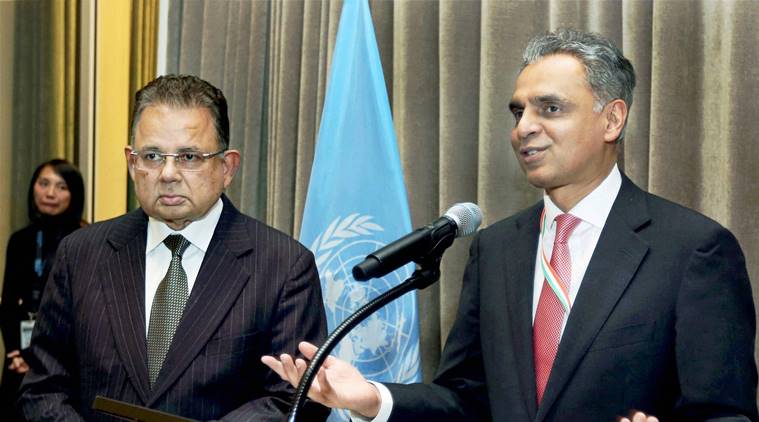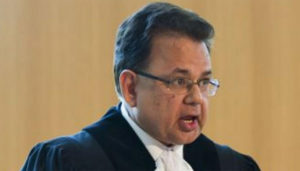Justice Dalveer Bhandari re-elected to the Hague after UK pulls out

New York: India's Permanent Representative to the United Nations Syed Akbaruddin speaks during a reception in the honour of Justice Dalveer Bhandari (L) at the United Nations in New York on Monday. India's Dalveer Bhandari won the votes in the UN General Assembly to make it to the International Court of Justice after UK pulled out the race. PTI Photo (PTI11_21_2017_000023B)

BY : News Gateway / Justice Dalveer Bhandari / New Delhi /
the International Court of Justice (ICJ) at the Hague, was re-elected with the backing of more thJustice Dalveer Bhandarian two-thirds of United Nations members after the United Kingdom withdrew its candidate at the last minute Tuesday.
High drama over ten days, which saw hectic diplomatic lobbying by Indian diplomats at the UN, preceded the election. This is the first time since 1946 that the UK will not be part of the ICJ, until now considered to be the prerogative of the P-5 members of the United Nations Security Council.
In the end, India won the high-stakes battle — Bhandari secured 183 of 193 votes in the United Nations General Assembly and 15 votes in the United Nations Security Council. He will now serve at the ICJ for the next nine-year term, and this is crucial for India — the high-stakes Kulbhushan Jadhav case is currently being heard by the international court at the Hague.
Within hours of Bhandari’s re-election, External Affairs Minister Sushma Swaraj tweeted: “Vande Matram — India wins election to the International Court of Justice. Jai Hind.”
The contest between UK’s nominee Christopher Greenwood and Bhandari had already seen six rounds — one on November 9 and five on November 13. While Bhandari had got a simple majority at the UNGA, Greenwood had led the contest at the UNSC.
According to UN rules, one who gets absolute majority in both the UNSC and UNGA is the clear winner. Sources said the UK wanted a ‘joint conference’ between the UNGA and UNSC convened under Article 12 (1) of the ICJ statute. A ‘joint conference’ would be a meeting between six countries — three each from the UNGA and UNSC. As per the ICJ statute, the joint conference has full freedom to decide on a name for the court and need not confine itself to official candidates.
Later, the UK did not, however, press for this option — it was last used in 1921. “We thought there was no gain in pushing ahead with the election. And we are happy that it has gone to one of our closest strategic partners,” a British diplomatic source said.
Late Monday night, British Permanent Representative to the UN, Matthew Rycroft, wrote identical letters to the presidents of the United Nations General Assembly and the Security Council before the two chambers were scheduled to meet at 3 pm (local time) for the next round of voting.
In his letter, Rycroft said the current deadlock is unlikely to be broken by further rounds of voting and the UK, therefore, had decided to withdraw Greenwood’s nomination. “In taking this step, we have borne in mind the close relationship that the United Kingdom and India have always enjoyed and we will continue to enjoy…,” Rycroft said.
This came just after India’s Permanent Representative to the UN, Syed Akbaruddin, met General Assembly president Miroslav Lajcak and Italian ambassador Sebastiano Cardi in his capacity as Security Council president for the month of November.
After the win, India welcomed the outcome, and said that the extraordinary support from the UN members was reflective of the respect for India’s strong constitutional integrity of the polity.
Prime Minister Narendra Modi called it a proud moment and credited External Affairs Ministry Sushma Swaraj and her ministry’s officials for their efforts in ensuring his success.
On her part, Swaraj made special mention of Syed Akbaruddin while hailing her ministry’s team. “Congratulations to Justice Dalveer Bhandari on his re-election as a Judge of the ICJ. Huge efforts by Team — MEA. Syed Akbaruddin, our Permanent Representative in the UN deserves a special mention,” she said on Twitter.
In a statement, the MEA said, “India has been supporting the campaign of Judge Bhandari through diplomatic efforts at different fora. The UK decided to withdraw its candidate after a closely fought electoral process. We appreciate the UK decision. We thank all those governments who supported India in this election.”